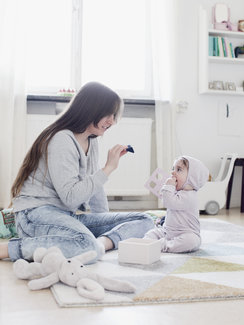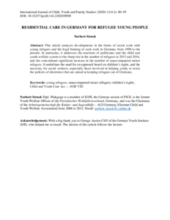

Displaying 111 - 120 of 423
The current randomized controlled trial examined the effectiveness of Video-feedback Intervention to promote Positive Parenting and Sensitive Discipline in Foster Care (VIPP-FC) on parenting behavior and attitudes in foster parents.
This study focuses on the continuity and disruptions of foster placements in France.
The first section of this paper describes the various links between care leavers and their families based on a literature review. In the second section, the biographical relevance of the family is highlighted based on the example of a qualitative interview study about the educational pathways of 20- to 27-year-old care leavers.
This article analyzes developments in the forms of social work with young refugees and the legal framing of such work in Germany from 1990 to the present.
This book brings together knowledge of how modern countries in Europe and the United States deal with the issue of errors and mistakes in child protection in a cross-national perspective.
In this article the authors look for a suitable method which takes account of power relations while investigating young people's perspectives on their everyday lives.
This study aimed at investigating the incidence of placement breakdown in Flemish family foster care (Dutch speaking part of Belgium) for unaccompanied children (UC), and to explore the association of breakdown with foster child, foster family and case characteristics.
The authors of this study interviewed 20 parents about their experiences with the Dutch child protection system (CPS).
The aim of this study is to explore foster child characteristics and the acceptance of foster children, by birth children and to compare mothers’ perceptions to birth children’s own perceptions.
This article describes the results of a narrative literature review on empirical research examining the outcomes and/or experiences of unaccompanied refugee minors in family foster care.


